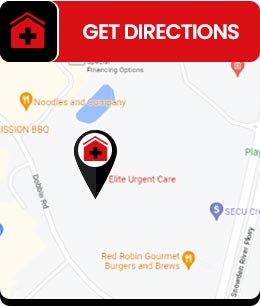Urgent Care for Cuts and Wounds in Columbia MD
Elite Urgent Care provides timely treatment for cuts and wounds, helping to reduce the risk of infection and promote faster healing. Whether it’s a minor scrape or a deeper laceration, our medical professionals can clean, close, and dress the injury properly. Prompt attention also ensures that you receive a tetanus shot or antibiotics if needed. For more information, contact us today or book an appointment online. We are conveniently located at 6100 Dobbin Rd, Suite A Columbia, MD 21045.


Table of Contents:
What is a wound?
What are the different types of wounds?
What are the different types of cuts on the skin?
How do you treat skin cuts and wounds?
An injury is a physical problem that damages your body. Many types of injuries can be caused by accidents, falls, hits, weapons, and more. In the United States, millions of people suffer injuries every year. The severity of these injuries varies from minor to life-threatening. Working or playing, driving a car, or walking across the street, injuries can happen at any time.
Injuries that break the skin or other tissues of the body are called wounds. The most common types of injuries are cuts, scrapes, scratches, and punctures. Wounds are usually caused by accidents, but surgery, sutures, and stitches can also cause them. Even though minor wounds aren’t serious, they should be cleaned as soon as possible. First aid may be necessary for serious or infected wounds, followed by a visit to the doctor. In addition, you should seek medical attention if the wound is deep, you cannot close it yourself, it is bleeding or dirt-filled, or it is not healing.
It is possible to have an open wound or a closed wound. Penetrating wounds, for example, are open wounds with exposed underlying tissue/organs. The term “closed wound” refers to a wound in which the underlying tissues and organs are not exposed.
Depending on how long it takes for a wound to heal, it can be classified as acute or chronic. Wounds that heal acutely are those that heal without complications within a reasonable timeframe. A chronic wound, on the other hand, takes a long time to heal and may be complicated.
Additionally, wounds can be classified according to whether they are clean or contaminated. Clean wounds do not contain any foreign material, whereas wounds that are contaminated or infected may contain dirt, bacteria, or other foreign materials. Depending on the stage of the wound, pressure wounds can be considered open or closed wounds.
It is also possible to have an internal or external wound. Internal wounds can occur as a result of impaired circulation, nerve damage, neuropathy, medical illness, or decreased blood, oxygen, or nutrition, while external wounds may be the result of an outside force or trauma caused by penetrating objects or non-penetrating trauma.
There are a wide variety of types of cuts that can impact the skin and falls into different categories. In the case of cuts, lacerations, gashes, and tears, the wound penetrates the skin and reaches the fat tissue. An object with a sharp edge causes this. Surface wounds, such as scrapes, abrasions, scratches, and floor burns, do not penetrate the skin completely.
Knees, elbows, and palms are common places for scrapes. An abrasion occurs when the surface layers of the skin (epidermis) are broken. Abrasions are more likely to occur on thin-skinned bony areas (like knees, ankles, and elbows). An incision is made when a sharp object cuts through the skin, such as a knife or a shard of glass. Blood loss can occur when underlying blood vessels are punctured, depending on the injury.
Depending on the type of wound you have, your doctor may use a variety of treatments. The wound may be closed using skin glue, sutures, or stitches after your doctor cleans and numbs the area. In the event of a puncture wound, you may need a tetanus shot.
Your doctor may decide not to close your wound and let it heal naturally depending on the location and potential for infection. However, there are other cases, such as when an individual has experienced a minor wound, where home treatment may be sufficient. However, it is always best to visit an urgent care clinic if you have any concerns about the cut or wound suffered.
Cuts and wounds can be treated at Elite Urgent Care. For more information, contact us or request an appointment online. We are conveniently located at 6100 Dobbin Rd, Suite A Columbia, MD 21045. We serve patients from Columbia MD, Ellicott City MD, Laurel MD, Clarksville MD, Elkridge MD, Fulton MD, Jessup MD, and surrounding areas.
Check Out Our 5 Star Reviews









